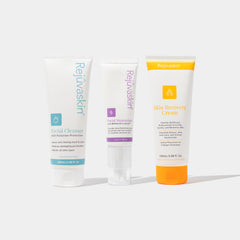Navigating the world of skincare can be overwhelming, with countless options available on the market. One of the most common questions is whether to choose clinical skincare products or stick with cosmetic skincare. While both have their merits, understanding their key differences and benefits is critical to making informed decisions about your skin.
What Is Clinical Skincare?
Clinical skincare, also known as medical-grade skincare, is formulated with advanced technology to address deeper skin concerns. These products are designed to penetrate the skin barrier and provide targeted solutions for issues like acne, hyperpigmentation, and premature aging.
Key Features of Clinical Skincare
-
Higher Concentrations of Active Ingredients: Clinical skincare includes high concentrations of proven ingredients like retinoids, peptides, and ceramides, which target specific skin concerns (Kornhauser et al., 2010).
-
Scientifically Tested: These products undergo rigorous testing in clinical settings to ensure their safety and efficacy (Bagatin & Miot, 2013).
-
Professional Guidance: Clinical skincare is often recommended and distributed by dermatologists or other licensed professionals to ensure proper use.
Who Should Use Clinical Skincare?
If you’re dealing with persistent skin concerns like acne scars or uneven tone, clinical skincare may be ideal. For example, Rejûvaskin’s Skin Recovery Cream is designed with botanical and hydrating ingredients to repair the skin barrier effectively.
What Is Cosmetic Skincare?
Cosmetic skincare products are widely available over the counter and are primarily formulated to maintain healthy skin. These products are best for general hydration, protection, and minor skin concerns.
Key Features of Cosmetic Skincare
-
Milder Formulations: Cosmetic products contain lower concentrations of active ingredients, making them suitable for sensitive skin and daily use (van Zuuren & Fedorowicz, 2017).
-
Focus on Aesthetics: Cosmetic skincare often focuses on improving the surface appearance of the skin rather than addressing underlying issues.
-
Accessibility: These products are available without a prescription at drugstores, online, or beauty retailers.
Who Should Use Cosmetic Skincare?
If you’re looking for basic hydration or sun protection, cosmetic skincare can meet your needs. For example, Rejûvaskin’s Gentle Cleanser provides gentle cleansing while maintaining a healthy skin barrier, making it a great cosmetic choice for daily care.
Key Differences Between Clinical and Cosmetic Skincare
|
Feature |
Clinical Skincare |
Cosmetic Skincare |
|
Ingredient Concentrations |
High, targeted for specific concerns |
Lower, for general care |
|
Regulation |
Clinically tested, higher scrutiny |
Minimal testing required |
|
Purpose |
Treats skin concerns at a cellular level |
Focuses on aesthetics |
|
Cost |
Higher, reflecting advanced formulations |
More affordable |
The Role of Science in Skincare Choices
Clinical skincare is supported by extensive research. For example, studies have shown that ceramides, a common ingredient in clinical formulations, play a critical role in restoring the skin barrier and improving hydration (Spada et al., 2021). In contrast, cosmetic products may focus on immediate, visible effects but lack the deeper benefits provided by scientifically validated active ingredients.
Why Rejûvaskin Stands Out
Rejûvaskin bridges the gap between clinical and cosmetic skincare by offering formulations that are both gentle and highly effective.
Featured Products
-
Skin Recovery Cream (link):
-
Repairs the skin barrier with botanical extracts like aloe vera and calendula oil.
-
Retinoid Face Serum (link):
-
Combats fine lines and uneven skin tone with clinically proven retinoids.
-
Gentle Cleanser (link):
-
Ideal for maintaining a healthy skin barrier with a soothing, non-irritating formula.
Works Cited
-
Bagatin, E., & Miot, H. (2013). How to design and write a clinical research protocol in Cosmetic Dermatology. Anais brasileiros de dermatologia. link
-
Kornhauser, A., Coelho, S., & Cohen, R. (2010). Penetration enhancers in dermatology. Clinical Dermatology. link
-
Spada, F., Harrison, I. P., & Barnes, T. M. (2021). A daily regimen of a ceramide‐dominant moisturizing cream and cleanser restores the skin permeability barrier. Dermatologic Therapy. link
-
van Zuuren, E. V., & Fedorowicz, Z. (2017). Emollients and moisturizers for eczema. The Cochrane Database of Systematic Reviews. link





















Leave a comment